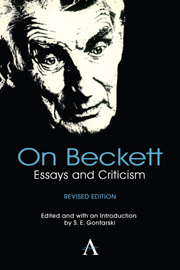Book contents
- Frontmatter
- Contents
- The Essential Beckett: A Preface to the Second Edition
- A Beckett Chronology
- Acknowledgments
- Crritics and Crriticism: “Getting Known”
- Preliminaries
- The Page
- Murphy and the Uses of Repetition
- Watt
- Mercier and Camier: Narration, Dante, and the Couple
- Molloy's Silence
- Where Now? Who Now?
- The Voice and Its Words: How It Is
- The Unnamable's First Voice?
- Between Verse and Prose: Beckett and the New Poetry
- Worstward Ho
- The Stage
- Coda
- Notes on Contributors
Molloy's Silence
from The Page
Published online by Cambridge University Press: 05 May 2013
- Frontmatter
- Contents
- The Essential Beckett: A Preface to the Second Edition
- A Beckett Chronology
- Acknowledgments
- Crritics and Crriticism: “Getting Known”
- Preliminaries
- The Page
- Murphy and the Uses of Repetition
- Watt
- Mercier and Camier: Narration, Dante, and the Couple
- Molloy's Silence
- Where Now? Who Now?
- The Voice and Its Words: How It Is
- The Unnamable's First Voice?
- Between Verse and Prose: Beckett and the New Poetry
- Worstward Ho
- The Stage
- Coda
- Notes on Contributors
Summary
What the author of Molloy is telling us is demonstrably the most outrageous of all truths: that there is nothing but inordinate fantasy, that everything is fantastical, extravagant, unquestionably repellent, but also that what is repellent is splendid. To put it more precisely, Molloy is repellent splendor incarnate. At the same time there is no narrative more necessary nor more convincing; Molloy shows us not merely reality, but reality in a pure state: reality at its most indigent and inevitable, the fundamental reality, which is always in front of us but which fear always separates us from, which we refuse to see and which we always strive to avoid being engulfed by, which is consequently known to us only under the elusive form of anguish.
I myself would be Molloy if I took no notice of cold, or hunger, or the numberless discomforts that oppress a man given over to nature, to the earth and the rain, to the vast quicksand of the world. Yet even so I can testify that he is a figure both you and I have met; in the grip of a timorous craving, we have met him at street corners, an anonymous figure consisting of the ineluctable beauty of rags, apathy, and an indifferent gaze, the age-old swarm of ordure; at a loss, to be sure, as regards being, and, like us, a derelict as regards doing.
- Type
- Chapter
- Information
- On BeckettEssays and Criticism, pp. 103 - 110Publisher: Anthem PressPrint publication year: 2012
- 1
- Cited by



